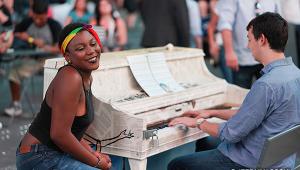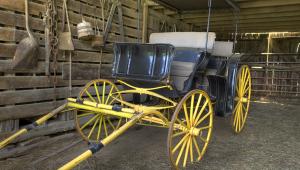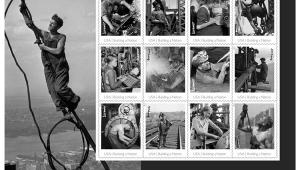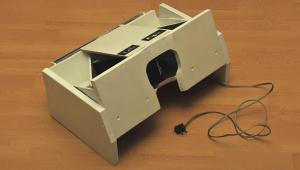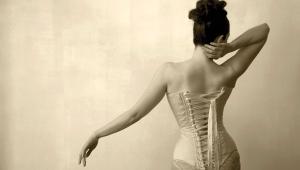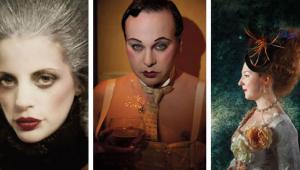Moving Images; The Photography Of Lois Greenfield Page 2
Backdrop Lighting Plays A Key Role
Greenfield's studio today is equipped with a custom-made, off-white muslin
backdrop suspended from a pole that stretches 20-ft wide. The muslin extends
a little way in toward the camera so that it forms a short sweep without ending
abruptly in a vertical drop at the wooden floor.
For her backgrounds, Greenfield will employ one pair of lights at different
levels (one high, the other low), aimed into the backdrop from a glancing angle.
When she wants the gradation to go from top to bottom, she positions a pair
of lights on each side of the backdrop. When necessary, she lets the lower lights
spill over onto the floor.
Greenfield continues: "The key lights, the fill lights, the background
lights--everything works together with the way I choose to light the backdrop
or not light the backdrop. So if we let the backdrop go gray, which I often
do, we either have the light sweep across the backdrop from left to right, resulting
in a light to dark gradation, or we have a very low setting on the upper lights
hitting the backdrop and gradate it from dark to light, from top to bottom.
And then we sometimes enhance that later digitally, darkening the backdrop even
further." On the other hand, in order to achieve a clean white backdrop,
she will light the background at between 3/4 to a full stop over the key light.
 |
|
|
Short And Sweet--Flash Duration, That Is
Greenfield has long been a proponent of Broncolor strobe lighting for the ultra-short
flash durations required to truly freeze the moment (she may set the power packs
as high as 1/2000 sec, but not less than 1/1000 sec). She also favors these
lights because they do not produce a shift in color balance when the power output
variator (which controls flash duration and recycling) is employed. Normally
with most strobe lighting systems, using the variator results in some color
shift.
And while she's widely known for employing umbrella lighting, Greenfield's
latest work centers around a special lighting accessory, the Broncolor Satellite
Soft, and the quality of light it produces. "The Broncolor Satellite Soft
is one of my favorite lights these days," Greenfield observes. "I
like it for the creamy skin tones it delivers and that combination of soft yet
directional lighting." Broncolor describes this reflector as a 35"
white-coated parabolic dish with a Plexiglas baffle, designed so the head shoots
through the reflector instead of into it. It is compatible with various Broncolor
flash lamp heads and monolights.
To deliver the awesome amount of light needed for her key light Greenfield uses
a special type of head known as a bitube, which actually gets its power by being
connected to two power packs simultaneously. That lets Greenfield reduce output
on each pack, which in turn lets the packs deliver the short 1/2000 sec flash
duration her pictures often require.
 |
|
|
More Information...
Widely exhibited here and abroad, Lois Greenfield also teaches photography nationwide
and around the world. While her studio is located in New York City, Greenfield
also travels around the country to photograph performing dance troupes and shoot
commercial jobs. You can see more of Greenfield's work online, read about
her workshops and monographs, and even treat yourself to a portfolio of her
images in a custom-designed screensaver (for Mac/Windows) at www.loisgreenfield.com.
For Broncolor lighting (available from Sinar Bron Imaging), go to www.sinarbron.com.
- Log in or register to post comments


